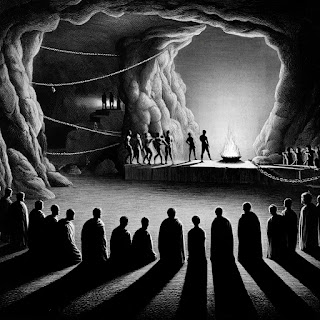Allegory of the Cave
In our pursuit of understanding, we often encounter a profound realization: reality is not always what it seems. This philosophical dilemma is vividly depicted in Plato's Allegory of the Cave, an essential exploration of metaphysical thought that challenges our perceptions of truth and reality. In the allegory, prisoners are confined to a cave, their heads immobilized, and they are forced to watch shadows cast on a wall by objects passing before a fire behind them. These shadows represent their entire perceived reality, yet they are only reflections of actual objects.
At the heart of Plato's allegory is the understanding that these shadows are not reality but distortions shaped by our confined perspectives. This is a powerful metaphor for human cognition, where what is perceived is often a skewed version of actual forms. Like prisoners, we depend on incomplete information that shapes our worldview.
In contemporary public health, we see analogous misconceptions, especially regarding the effectiveness and fairness of healthcare systems. Despite the United States spending about 18% of its GDP on healthcare—significantly more than other industrialized nations—it does not achieve better outcomes in crucial health indicators such as life expectancy and infant mortality rates. This disparity challenges the assumption that high investment in healthcare technology and innovation alone can drive superior health outcomes.
Health outcomes across different social strata further emphasize this misalignment. As Donald Barr points out, "most of the variability in health status we find in the United States and other developed countries has little to do with health care and everything to do with one's position in the social hierarchy." This observation underscores the discrepancy between perceived and actual effectiveness in healthcare.
We have a powerful role as modern-day seekers of truth, like the freed prisoner in Plato's narrative. We must challenge entrenched beliefs and reveal the broader determinants of health that hide behind the shadows of socioeconomic disparities. This role is not just important; it is crucial in shifting paradigms and advancing public health. We have the power to make a difference.
Despite significant advancements in medical technologies and pharmaceuticals, which are presumed to enhance healthcare delivery, they often fail to tackle the root causes of health inequities. The prohibitive costs of treatments, such as those for Hepatitis C, which may reach up to $100,000 per patient, highlight how market-driven solutions disproportionately benefit those within higher social echelons, thereby deepening health disparities.
The continuous political confrontations over health policies, including the repeated attempts to repeal the Affordable Care Act, demonstrate the polarized views on what constitutes a just and equitable healthcare system. This polarization reflects a broader societal struggle to align healthcare provisions with the actual needs of the populace versus the ideological projections we contend with.
Plato's Allegory of the Cave teaches us about the transformative power of enlightenment and the courage needed to challenge the status quo. In public health, this translates into a rigorous examination of how factors like income, employment status, and resource accessibility more accurately determine health outcomes than medical interventions alone. By acknowledging the distortions created by our preconceptions and societal structures, we can begin to address the real drivers of health and work towards a more equitable and effective healthcare system. This is not just a goal but a necessity that should motivate us all.
As we step out of the shadows of the cave and into the light of understanding, let us be guided by the wisdom of ancient philosophy and the empirical evidence of modern science in reshaping our views on health and equity. This path, though challenging, holds the promise of a reality where healthcare transcends the barriers of economic privilege and becomes a fundamental right for all. This prospect should inspire hope and a renewed commitment to advocating for change.
